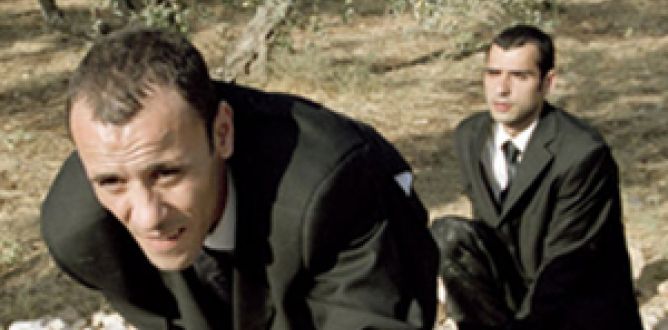Paradise Now Parent Guide
Parent Movie Review
Bringing a believable face to their characters is the ultimate goal of many dramatic directors. But for Hany Abu-Assad the challenge is embroiled by his highly controversial subject matter—the humanization of a suicide bomber.
Paradise Now takes an intimate look into the lives of two young Palestinian men living in a West Bank refugee camp. Born and raised in the fenced-off enclosure, the childhood friends long ago determined they would die together as martyrs if the requirement ever came. Now they’ve been approached by Jamal (Amer Hlehel), a point man for a nameless Palestinian organization that has planned a strike in Tel Aviv.
As the harsh reality slowly sinks in, Said (Kais Nashef) and his friend Khaled (Ali Suliman) are faced with the finality of the request. Unable to tell their families, the two men spend their last night at home, eating a traditional meal and trying to carry on their normal activities. In the evening, Khaled parades about with an almost hollow confidence, while Said deals more thoughtfully with what he believes is his ultimate fate. Sneaking out in the dead of night, he makes what may be his final visit to the house of his friend Suha (Lubna Azabal), but is powerless to tell even her about the plot.
The next day, the men, wired with explosives, slip through a hole in the barricade and head for the city. However, a setback stalls the mission, separates the men and gives each of them a chance to rethink his commitment to the cause. When Suha discovers their scheme, she desperately urges them to consider a more moderate approach to help resolve the ongoing conflict.
The lines between oppressor and victim, empty bravado and heartfelt conviction, sacrifice and revenge all blur at times. It’s disturbing watching Khaled nervously recite his final martyr’s message into a video camera while Jamal and the other calloused organizers look on casually munching pitas. Even more unsettling is when the men discover the recording didn’t work and demand Khaled repeat his grave communication without any regard for the deathly position they’ve put him in.
Following the characters’ painful journey allows the viewer to look at the complex reasons behind their difficult decisions, without condemning or condoning them. Some of the motivations explored are past experiences in the bombers’ lives and the helplessness they feel in their situation. We also get a glimpse at the ache of those who may be left behind.
Brief strong language (in subtitles) and the depiction of smoking (both cigarettes and a water pipe) are included in the script. While violent portrayals are never more graphic than a tussle leading to a bloody nose, the whole premise of suicidal bombings brings an uneasy tension that builds throughout the production.
The remarkable acting, foreign locales and disquieting topic all mesh to create an uneasy observation of the region’s ongoing conflict. For adults and older teens, this subtitled screenplay may spark discussions about the rationale behind the actions, alternatives to establishing peace and the human cost of war on both sides of the battle. While audiences can never approve of this desperate approach to peace, they may at least see a different perspective of conflict.
Theatrical release October 27, 2005. Updated March 18, 2009
Paradise Now
Rating & Content Info
Why is Paradise Now rated PG-13? Paradise Now is rated PG-13 by the MPAA for mature thematic material and brief strong language.
Although this movie is about a highly violent act—choosing to be a suicide bomber—it has no violence on screen, except for a tussle that results in a bleeding nose. Language includes a sexual expletive and a few other profanities, all in subtitles (and assumedly spoken in the film’s foreign dialogue). However, this film creates a high amount of tension and deals with obvious mature themes. Finally, characters smoke cigarettes and a traditional water pipe (of which the contents are unknown).
Page last updated March 18, 2009
Paradise Now Parents' Guide
During filming, the cast and crew endured military attacks and sparked controversy in the community. To read an interview with the movie’s director, go to http://wip.warnerbros.com/paradisenow/. Click on About the Production and follow the link to A Conversation with Hany Abu-Assad.
What is the difference between fanaticism and dedicated commitment? What motivates these men to make the choices they do? What kinds of circumstances lend themselves to promoting this type of behavior? What effects do their choices have on the overall conflict and on the others around them?
One character says, “If there is no security for us, there will be none for them [the Israelis].” How does this attitude affect peace efforts? How do people adapt to living in a military zone? Why do the organizers send others to carry out the bombings rather than undertake the mission themselves? How do they exploit the weaknesses of the recruits? What does that say about their approach to the cause?
Home Video
The most recent home video release of Paradise Now movie is March 20, 2006. Here are some details…
Related home video titles:
Cultural-based films can give viewers insight into other societies. In Whale Rider, a young Maori girl in New Zealand challenges century-old customs concerning tribal leadership. In Rabbit-Proof Fence, government officials take three Australian Aboriginal children from their community in an effort to improve their future. Escaping from the institution, the girls begin a 1500-mile journey back to their homes. The Iranian film Children of Heaven gives a glimpse into the domestic life of a meager-income family struggling to make ends meet.

